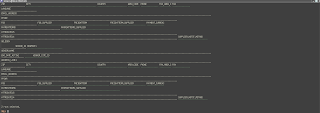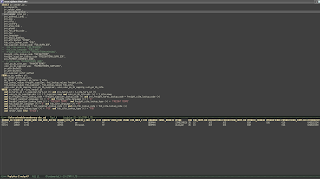I knew I could start SQLPlus in a shell-buffer, but the output from a select would look just like so:

Hm. Not very useful. How can one tell SQLPlus to use just the minimum space for each column? One can't. Each column must be tailored individually.
Then I looked at several Emacs-modes out there for SQLPlus. Most of them did not install right away or screwed up based on my data (OK, data from the Oracle EBS is insane - you would not see tables with so many columns anywhere else - but still it is perfectly legal). I tried to fix the problems, but could not - the elisp-code was just too much for me. Damn it, most of these modes try to emulate whole IDEs!
So, that was not what I wanted. So I rolled my own. The result is quite usable for me. Here is a screen-shot:

In the buffer above you can enter SQL and send it with Ctrl-Enter (anywhere in the paragraph) to SQLPlus, the result appears nicely formatted in the lower buffer. When you first type Ctrl-Enter, a buffer appears in which you have to start SQLPLus and log on to Oracle. sqlplus-2-mode interacts with this buffer behind the scenes. Results from SQLPlus are displayed in the buffer *sqlplus-2-output*. Only the first few rows (this is configurable) are displayed - after all, this is not a reporting-tool.
Now, I can concentrate on the SQL and fear no more crashes - finally!
You can get the mode here. I assume that you know how to set up an emacs-mode, so I will not explain it here. There are still a few problems to be solved (long-running statements are not handled well) - once that is solved, I will write end-user-friendly documentation. Right now it is just a quick hack :-)
Finally I found a solution to this problem. I was also facing this problem and refereed so many other blogs too to know how to solve this issue. I will try the solution that you have posted above and yes its a quick hack to sort out this issue. Thanks.
ReplyDeleteoracle ebs r12